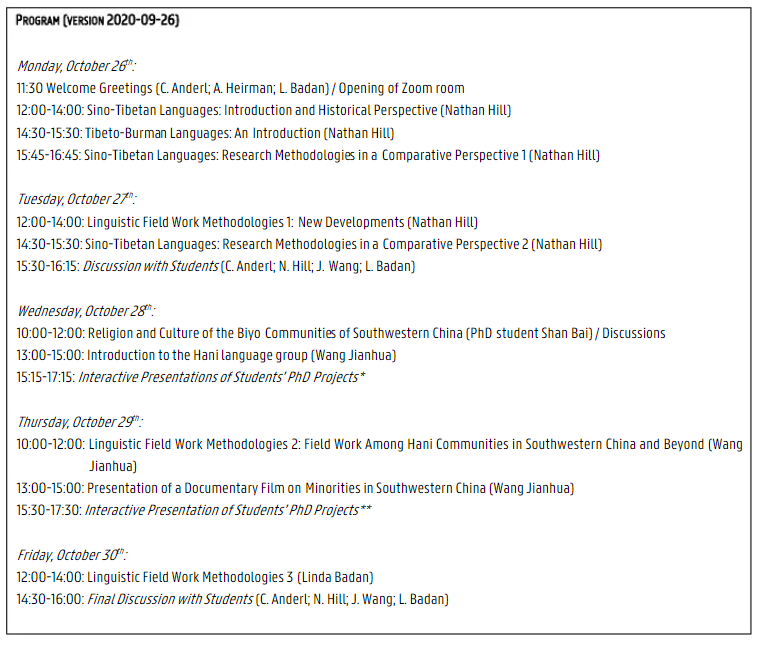Abstract: This specialist course will focus on an interdisciplinary approach to the Sino-Tibetan (ST) language family, with an emphasis on languages of the Tibeto-Burman (TB) branch spoken by ethnic minorities in China. In the course there will be an emphasis on linguistic aspects, such as the genetic relations between the ST languages in a historical perspective, comparative approaches to the study of language families, fieldwork research on endangered languages, fieldwork methodologies, as well as the cultural and religious background of ST speaking ethnic minorities in China.

Thanks to the generous support of the TIANZHU FOUNDATION, we are pleased to award up to 800 Euros in travel remuneration of five international PhD students. This money can be used for travel, accommodation, and meals. To apply for this travel grant, please send a one-page cover letter and your CV to Christoph.anderl@ugent.be by July 31st, 2020. The selected candidates will be notified by August 10th , 2020.
Organizers
Name: Prof. Christoph Anderl
Faculty: Arts and Philosophy
Department: Languages and Cultures (Ghent Centre for Buddhist Studies / DiaLing)
E-mail: Christoph.anderl@ugent.be
Co-organizers:
Prof. Ann Heirman (Languages and Cultures – East Asia)
Prof. Linda Badan (Translation, Interpreting and Communication / MULTIPLES / DiaLing)
Course
Title: Sino-Tibetan Languages: Research Methodologies and Approaches to Linguistic Field Studies and Language Documentation among Tibeto-Burman Speaking Minorities in China
Dates: October 26 – 30, 2020
Venue: Het Pand, Ghent
Based on the current Covid19 situation, the DS could be also transformed into an online event, if necessary.
Topic of the course
The course focuses on the Sino-Tibetan language family and Tibeto-Burman languages as spoken in Southwestern regions of China, as well as the sociocultural, religious, and ecological contexts of ethnic minorities of these regions. The DS will provide an overview of ST languages in a historical perspective, and deal with the research of language families in a comparative context (especially contrasting / comparing the Indo-European and Sino-Tibetan groups). More specifically, the focus will be on Tibeto-Burman languages as spoken in the Southwestern region of Yunnan, China, many of them being endangered and on the verge of becoming extinct. The linguistic aspects will be discussed in a contextualized way, giving consideration to the sociocultural, religious (e.g., Buddhism, Christianity, and native religions), and environmental / ecological aspects of the ethnic minority communities. Another part of the course will concretely deal with linguistic fieldwork methodologies and the documentation of endangered languages.
Tentative programme with time schedule: The five-day course will have 5 – 6 contact hours a day (ca. 27 contact hours all together), includinglectures, discussions of research material, presentations by the PhD students, round-table discussions, and documentary film screenings.
Program
Monday, October 26th:
11:30 Welcome Greetings (C. Anderl; A. Heirman; L. Badan) / Opening of Zoom room
12:00-14:00: Sino-Tibetan Languages: Introduction and Historical Perspective (Nathan Hill)
14:30-15:30: Tibeto-Burman Languages: An Introduction (Nathan Hill)
15:45-16:45: Sino-Tibetan Languages: Research Methodologies in a Comparative Perspective 1 (Nathan Hill)
Tuesday, October 27th:
12:00-14:00: Linguistic Field Work Methodologies 1: New Developments (Nathan Hill)
14:30-15:30: Sino-Tibetan Languages: Research Methodologies in a Comparative Perspective 2 (Nathan Hill)
15:30-16:15: Discussion with Students (C. Anderl; N. Hill; J. Wang; L. Badan)
Wednesday, October 28th:
10:00-12:00: Religion and Culture of the Biyo Communities of Southwestern China (PhD student Shan Bai) / Discussions
13:00-15:00: Introduction to the Hani language group (Wang Jianhua)
15:15-17:15: Interactive Presentations of StudentsÕ PhD Projects*
Thursday, October 29th:
10:00-12:00: Linguistic Field Work Methodologies 2: Field Work Among Hani Communities in Southwestern China and Beyond (Wang Jianhua)
13:00-15:00: Presentation of a Documentary Film on Minorities in Southwestern China (Wang Jianhua)
15:30-17:30: Interactive Presentation of StudentsÕ PhD Projects**
Friday, October 30th:
12:00-14:00: Linguistic Field Work Methodologies 3 (Linda Badan)
14:30-16:00: Final Discussion with Students(C. Anderl; N. Hill; J. Wang; L. Badan)*
Presentations: (1) Selin Grollmann (Univ. of Bern): A grammar of Nachiring: Describing an endangered language of eastern Nepal /(2) Valentina Punzi (Univ. of Tartu): Linguistic identity and cultural heritagization in the Sino-Tibetan borderlands: reflections of a 90hou Baima ritual expert on mother tongue / (3) Nikita Kuzmin (Univ. of Pennsylvania): ÒHow to master the Tangut language? A newview on Tangut manuscripts with Tibetan glosses from Khara-khoto ** Presentations: (4) Deng Bingcong (Max Planck Institute, Euroasia3angle Project): Transeurasian loanwords in Sino-Tibetan: Whatcan they tell us? / (5) Pascal Gerber (Univ. Bern): A historical grammar of Mewahang: Aim, Methods and Preliminary Findings / (6) Bai Shan (Ghent Univ.): Field studies among Biyo communities